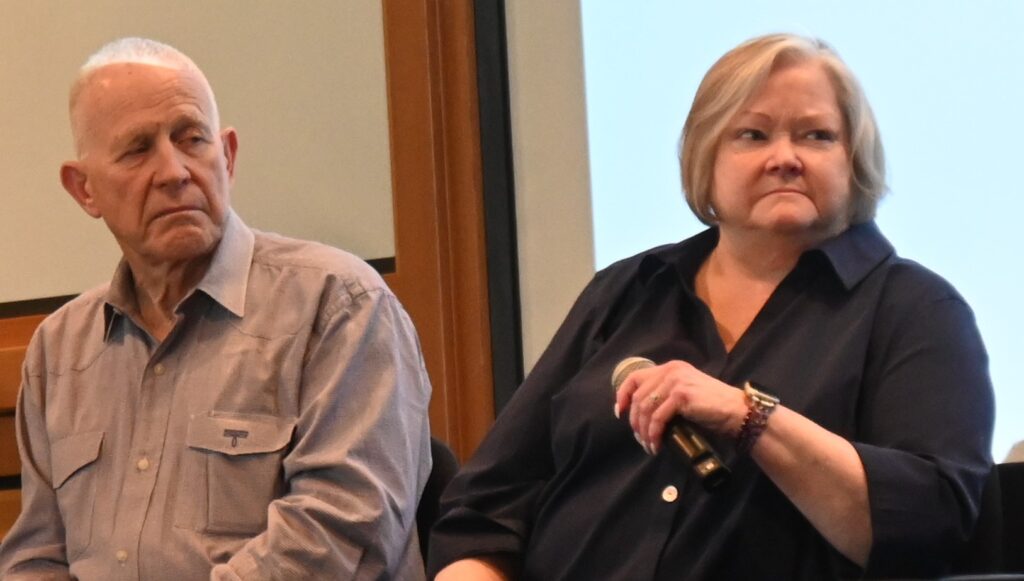SAN FRANCISCO, California — The parents of Mathew Shepard, a gay man who was fatally attacked, spoke here Jan. 30 at a day-long hate crimes summit, organized by the US Justice Department.
The summit was attended by the FBI, local district attorneys, police chiefs, and leaders of community-based organizations.
According to FBI Uniform Crimes Report data, 11,288 hate crimes involving 13,278 victims were documented in 2022, an uptick from the previous year. 1,947 attacks were fueled by the victim’s sexual orientation, while 469 were based on gender identity. White males were overwhelmingly the perpetrators across all categories of hate crimes.
Hate crime convictions, however, are surprisingly low. In 2021, federal prosecutors charged just 40 people with bias-motivated crimes, and obtained 35 convictions. UCR reports do not include the number of convictions.
‘An Ordinary Kid’

“Matthew was just an ordinary kid, not a martyr, not a saint,” said Dennis Shepard, noting that his son — who died at the age of 21 — spoke 6 languages, hunted, fished, rode horses, and was active in local theater.
On the night of Oct. 6, 1998, Shepard, a student at the University of Wyoming in Laramie, was at a bar in town. Two young men, Aaron McKinney and Russell Henderson, offered to give him a ride home.
“They were going to rob him because he dressed nice. They thought he must be gay and have money,” said Judy Shepard.
Brutal Attack
“So they drove him out to the prairie, tied him to a fence, beat him with the butt of a 357 Magnum, took his shoes and drove away. He was found 18 hours later by a mountain biker, taken to the local hospital, and then sent to Colorado because the Laramie Hospital couldn’t handle the severity of his head injuries,” she said. Her son died after 6 days on life support.
No hate crime laws existed at the time. McKinney and Henderson were both eligible for the death penalty, but got two consecutive life sentences.
James Byrd
The Shepards fought a decade-long battle to establish a federal hate crime law. The Matthew Shepard and James Byrd, Jr., Hate Crimes Prevention Act was signed into law on Oct. 28, 2009 by former President Barack Obama.
Byrd was a Black man who was murdered in Texas in 1998 by three avowed white supremacists. Shawn Berry, Lawrence Brewer, and John King chained Byrd by his ankles to their pickup truck, then drove for three miles on an asphalt rode, dismembering his body. They then dumped Byrd’s remains outside a Black church. Brewer and King received the death penalty, while Berry was sentenced to life in prison; he will be eligible for parole in 2038.
Judy Shepard said she was mindful of the fact that the case of her “blonde haired, blue eyed” son received massive media attention, while similar cases involving people of color have often gone under the radar.
Disabled Native American
FBI Special Agent Kyle Biebesheimer said at the summit that he had the distinction of charging the first Shepard-Byrd violation in Northern California. In 2020, Ole Hansen Hougen, who had a history of perpetrating race-bated attacks, stabbed a Black man 10 to 20 times in Santa Cruz, California, repeatedly calling him a “nigger” and a “faggot.” The victim, who was not named in court documents, survived the attack.
“It was because of the Shepard statute that we were able to charge a hate crime. The jury came back with a guilty verdict in 20 minutes,” said Biebesheimer. Hougen was sentenced to 82 months in prison.
Dennis Shepard spoke of the first case in which the Shepard-Byrd Act was charged. In 2010, three men, Paul Beebe, Jesse Sanford, and William Hatch, kidnapped a developmentally disabled Native American man in Santa Fe, New Mexico. The victim, who has never been named, was taken to Beebe’s apartment, which displayed the Nazi flag and other racist paraphernalia.
Branded With a Hot Coat Hanger
Beebe heated a coat hanger to burn a swastika onto the victim’s forehead. The defendants also admitted that they defaced the victim’s body with white supremacist and anti-Native American symbols, including shaving a swastika in the back of the victim’s head and using markers to write the words “KKK” and “White Power” within the lines of the swastika. They recorded the heinous attack on their cell phones.
Beebe was sentenced to 8 1/2 years in prison, while Sanford received a sentence of 5 years. Hatch was sentenced to 18 months.
“We have to humanize this issue. There are real people here,” said Judy Shepard. “We are more than just a newspaper clipping,” she said. The Shepards have established the Matthew Shepard Foundation to keep alive their son’s legacy.
EMS’ Stop The Hate initiative is made possible with funding from the California State Library in partnership with the California Commission on Asian and Pacific Islander American Affairs. The views expressed on this website and other materials produced by EMS do not necessarily reflect the official policies of the CSL, CAPIAA or the California government.





